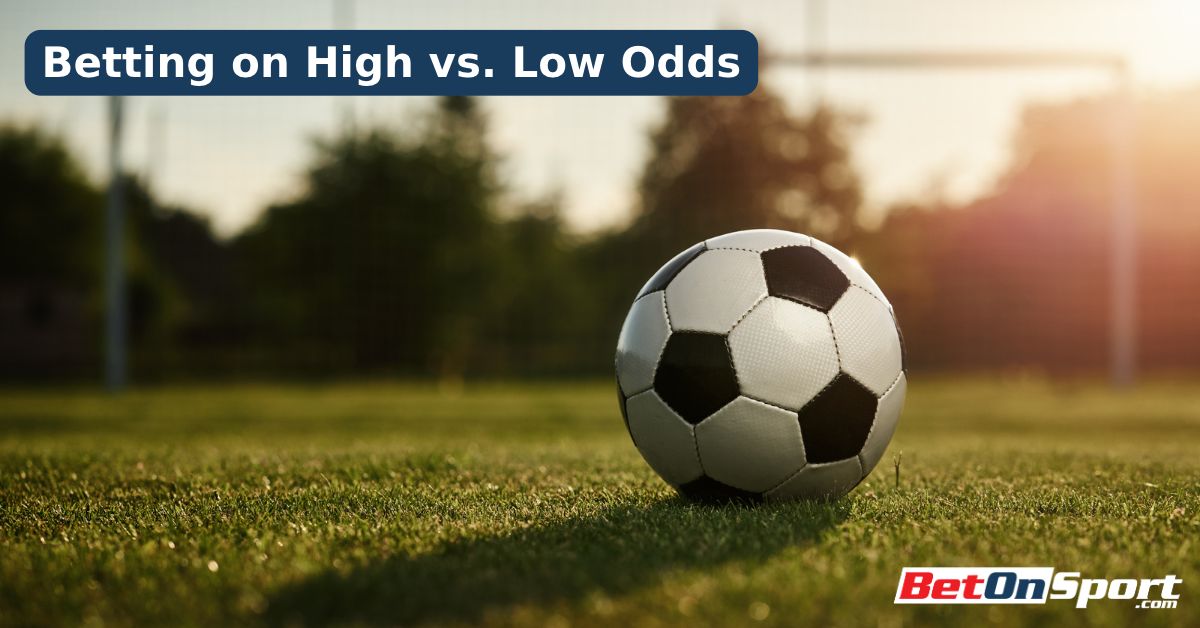Is it better to bet on high odds or low odds? This is probably one of the oldest questions when it comes to betting.
Are safer bets better for long-term profitability? Or is taking low-probability, high-reward bets the smarter play? Stay tuned for a simple guide on high and low odds betting, with some basic betting strategies.

What Are Low/High odds?
Before going any further, we will have to define our terms, and what exactly separates them.
We will, however, assume that you are familiar with the basic concepts of betting odds and how betting odds work.
Opinions sometimes greatly differ about which betting odds are low and which are high. Generally speaking though, the dividing line is put somewhere around 1/1 (2.00). That is because a 1/1 (2.00) odds bet has a roughly 50% chance of winning. Anything lower than 2.00 has a higher probability of occurring than not occurring. Conversely, odds bigger than 1/1 get increasingly less likely to win, but the potential winnings increase as well.
In practice, however, not a lot of punters would consider 10/11 (1.90) odds a “safe bet”. Thus, only odds considered more than 70% probable i.e. odds of 1.33 (1/3) and lower are considered short odds, or “safe” bets. By the same logic, odds over 2.50 (6/4), being less than 40% probable, are considered high. Everything in between is usually medium odds.
What are the advantages of betting on low odds?
It goes without saying that winning low odds bets is simply more likely to happen. You’re not winning anything big, though. Thus, taking these odds is for a more defensive, conservative strategy. In terms of profits, think of a slow trickle of small amounts that adds up over time.
Professional bettors and statistics generally agree: slow and safe is the way to go long-term. There’s no guarantee, obviously, but with a good betting strategy, some luck, and a lot of patience and restraint – low odds are more likely to end up with you earning a net positive at the end of the month.
Given their safe nature, you might be tempted to stack a bunch of low-odds bets in multiples. Sadly, statistics are also against accumulators: bookmakers rarely provide enough of a profit margin to keep up with an acca’s exponentially decreasing probability of winning.
What are the advantages of betting on high odds?
Of course, we’re not saying to avoid high odds bets at all costs. These have the potential to greatly increase your stake with a single win, which can yield quick profits. Betting theory also supports some strategies which include betting small amounts on a large number of high-odds single bets. Their nature also negates the need for accumulators.
Also, betting on the underdogs is comparatively more exciting and fun. At the end of the day, sports betting is a form of entertainment, so isn’t this what it’s all about?
In conclusion, there’s no straight answer of which choice is outright better. It all depends on what you’re hoping to gain from your punting. Besides, a sound strategy and knowledge of the game in question can tip the balance against statistics. We just hope this short betting tutorial gave you a general sense of what do to in the future. Good luck!
 Betonsport.com Free Bet Tips, Match Previews, and Predictions from Pro Tipsters.
Betonsport.com Free Bet Tips, Match Previews, and Predictions from Pro Tipsters.


